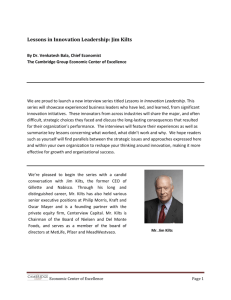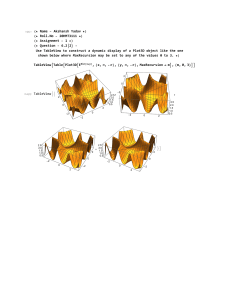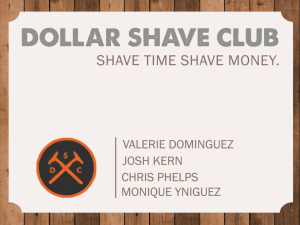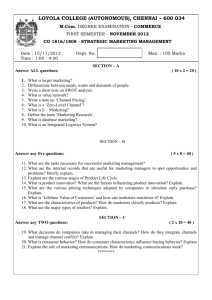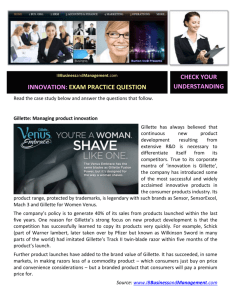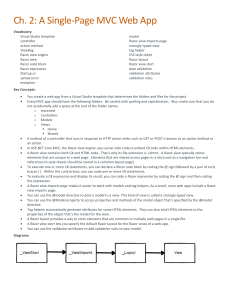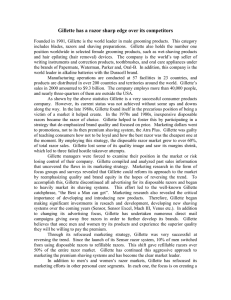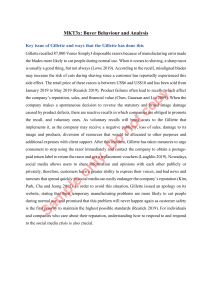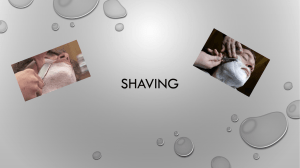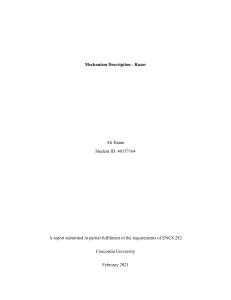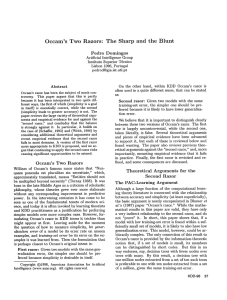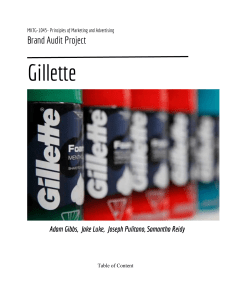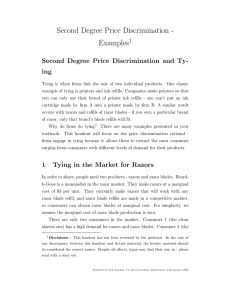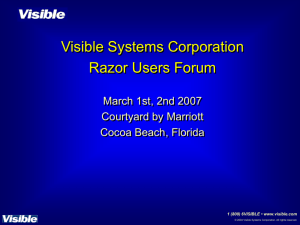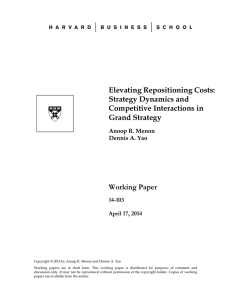Product Strategy Chapter 11
advertisement
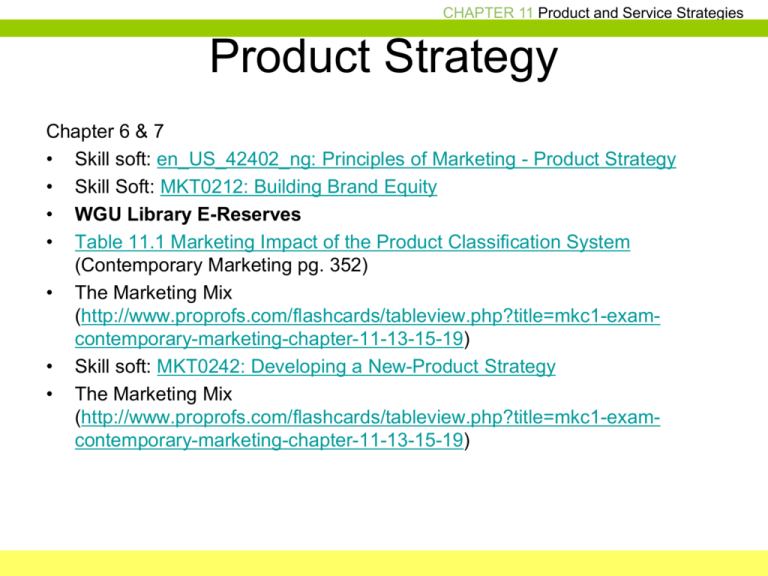
CHAPTER 11 Product and Service Strategies Product Strategy Chapter 6 & 7 • Skill soft: en_US_42402_ng: Principles of Marketing - Product Strategy • Skill Soft: MKT0212: Building Brand Equity • WGU Library E-Reserves • Table 11.1 Marketing Impact of the Product Classification System (Contemporary Marketing pg. 352) • The Marketing Mix (http://www.proprofs.com/flashcards/tableview.php?title=mkc1-examcontemporary-marketing-chapter-11-13-15-19) • Skill soft: MKT0242: Developing a New-Product Strategy • The Marketing Mix (http://www.proprofs.com/flashcards/tableview.php?title=mkc1-examcontemporary-marketing-chapter-11-13-15-19) CHAPTER 11 Product and Service Strategies • Marketing mix Blending of the four strategy elements —product, distribution, promotion, and price—to fit the needs and preferences of a specific target market. • Marketers develop strategies to sell both tangible goods and intangible services. CHAPTER 11 Product and Service Strategies WHAT IS A PRODUCT? • People buy want satisfaction, not objects. • Example: Consumers buy televisions because they want entertainment, not because they want a box with a screen. • Product Bundle of physical, service, and symbolic attributes designed to satisfy a customer’s wants and needs. WHAT ARE GOODS AND SERVICES? • Services Intangible tasks that satisfy the needs of consumer and business users. • Goods Tangible products that customers can see, hear, smell, taste, or touch. CHAPTER 11 Product and Service Strategies THE GOODS SERVICES CONTINUUM CHAPTER 11 Product and Service Strategies • Services distinguishable from goods in several ways: • Services are intangible. • Services are inseparable from the service providers. • Services are perishable. • Companies cannot easily standardize services. • Buyers often play important roles in the creation and distribution of services. • Service standards show wide variations. • Products often blur the distinction between goods and services. • Example: U-Haul is a service that rents trucks and moving vans, which are goods. CHAPTER 11 Product and Service Strategies CLASSIFYING GOODS AND SERVICES FOR CONSUMER AND BUSINESS MARKETS • Consumer (B2C) products Product destined for use by ultimate consumers. • Business (B2B) products. Product that contributes directly or indirectly to the out- put of other products for resale; also called industrial or organizational product. • Some products fall into both categories. • Example: Prescription drugs, which are marketed to doctors and to end users. CHAPTER 11 Product and Service Strategies TYPES OF CONSUMER PRODUCTS CHAPTER 11 Product and Service Strategies CLASSIFYING CONSUMER SERVICES • Marketers rely on five questions to classify services: • What is the nature of the service? • What type of relationship does the service organization have with its customers? • How much flexibility is there for customization and judgment on the part of the service provider? • Do demand and supply for the service fluctuate? • How is the service delivered? APPLYING THE CONSUMER PRODUCTS CLASSIFICATION SYSTEM • Buying behavior and marketing mix choices patterns differ for different product types. CHAPTER 11 Product and Service Strategies CHAPTER 11 Product and Service Strategies WORLDWIDE QUALITY PROGRAMS • Leadership of several large U.S. corporations led to quality revolution of the 1980s. • Goal was to better compete with Japanese manufacturers, who were perceived as achieving very high quality. • U.S. Congress established the Malcolm Baldrige National Quality Award to recognize excellence in quality management. • ISO 9002 standards implemented by the European Union define international criteria for quality management and assurance. • U.S. member body of ISO is National Institute of Standards and Technology. CHAPTER 11 Product and Service Strategies QUALITY OF SERVICES • Service encounter—point at which customer and service provider interact, which usually determines the customer’s perception of the quality of service. • Service quality—expected and perceived quality of a service offering. • Determined by five variables: • Tangibles, or physical evidence. • Reliability, or consistency of performance and dependability. • Responsiveness, or the willingness and readiness of employees to provide service. • Assurances, or the confidence communicated by the service provider. • Empathy, or the service provider’s efforts to understand the customer’s needs and then individualize the service. CHAPTER 11 Product and Service Strategies DEVELOPMENT OF PRODUCT LINES • Product line Series of related products offered by one company. • Marketing entire product lines can help company grow, economize company resources, and exploit product life cycles. DESIRE TO GROW • Growth potential limited if company focuses on a single product. • Example: L. L. Bean began selling a single style of boots but has grown by selling a variety of products. CHAPTER 11 Product and Service Strategies THE PRODUCT MIX • Assortment of product lines and individual product offerings that the company sells. PRODUCT MIX WIDTH • Number of product lines a firm offers. PRODUCT MIX LENGTH • Number of different products a firm sells. PRODUCT MIX DEPTH • Variations in each product that the firm markets in its mix. CHAPTER 11 Product and Service Strategies PRODUCT MIX DECISIONS • Firms evaluate the effectiveness of the width, length, and depth to make decisions about adding or eliminating products from their offerings. • Firms may decide to add to their mixes by purchasing product lines from other companies. • Line extension—adding individual offerings that appeal to different market segments while remaining closely related to the existing product line. • Marketing environment also plays an important role in evaluating the firm’s product mix. CHAPTER 11 Product and Service Strategies THE PRODUCT LIFE CYCLE • Product life cycle Progression of a product through introduction, growth, maturity, and decline stages. Stages in the Product Lifecycle CHAPTER 11 Product and Service Strategies EXTENDING THE PRODUCT LIFE CYCLE • Product life cycles can be extended indefinitely as a result of marketers’ decisions. INCREASING FREQUENCY OF USE • Convincing current customers to buy a product more frequently boosts total sales even if no new buyers enter the market. • Example: Hershey now offers its famous Hershey’s Kisses with personalized messages such as “Congratulations,” “It’s a Boy,” and “Happy Birthday”. INCREASING THE NUMBER OF USERS • Attracting new customers who have not previously used the product. • Example: NBC Universal recently announced plans to start a 24hour local news channel in New York. CHAPTER 11 Product and Service Strategies FINDING NEW USES • New applications extend a product’s life cycle. • Arm & Hammer cites a variety of alternative uses throughout the house for its baking soda. CHANGING PACKAGE SIZES, LABELS, OR PRODUCT QUALITY • Example: Procter & Gamble rejuvenated its Herbal Essences shampoo line by aiming at a younger generation of consumers with new packaging and language. • Example: Intelligentsia Coffee has stopped selling its espresso and coffee in 20-ounce sizes, opting instead for the 12-ounce cup. CHAPTER 11 Product and Service Strategies VIDEO Watch Gillette Video Watch Schick Video • Positioning and repositioning are important product concepts. Schick’s new four-blade Quattro razor has met the marketing challenge posed by Gillette’s Mach 3 three-bladed razor. Compare the ads for each razor. What can you deduce about the positioning of each razor from differences in presentation and language? CHAPTER 11 Product and Service Strategies VIDEO Watch Florida Orange Juice Video • Repositioning is an important concept. How does Florida Orange Juice reposition its product in this ad? Compare this ad with the repositioning ads for Schick and Gillette.
